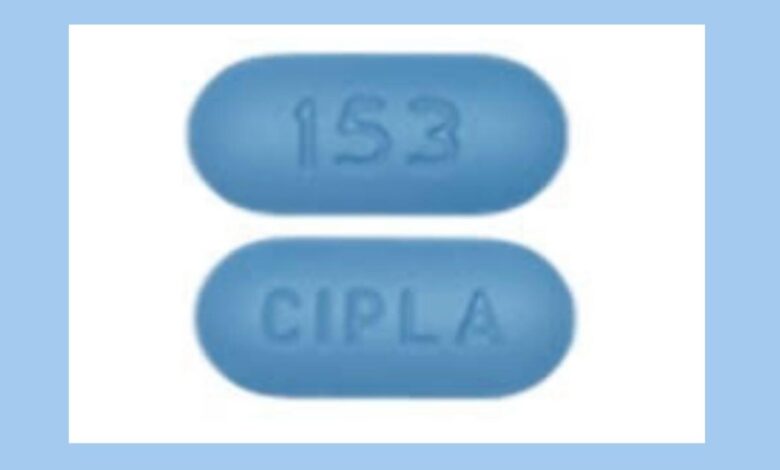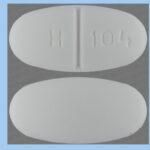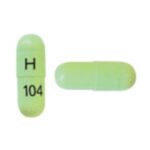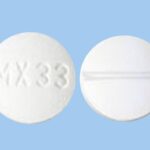Cipla 153 Pill: Uses, Dosage, Side Effects, Interactions

The blue, capsule-shaped pill with the imprint CIPLA 153 has been identified as Valacyclovir Hydrochloride 500 mg. It is supplied by Cipla USA Inc.. Valacyclovir is used to treat viral infections caused by a group of viruses called herpes simplex viruses. These infections include oral and genital herpes, shingles, and chickenpox.
• Oral herpes causes cold sores. These are small, painful sores that you can get in or around your mouth. Cold sores can be spread by kissing or other physical contact with the infected area of the skin.
• Genital herpes is a sexually transmitted disease. This means it’s spread through sexual contact. Symptoms include small, painful blisters on the genital area. You can spread genital herpes to your sexual partner even when you don’t have any symptoms. This drug is used to treat or prevent flare-ups of genital herpes in people with normal immune systems, or in people with HIV.
• Shingles. is caused by the same virus that causes chickenpox (varicella zoster). Symptoms of shingles include small, painful blisters that appear on the skin. Shingles can occur in people who have already had chickenpox. It can also spread to people who have not had chickenpox before through contact with the infected skin.
• Chickenpox. causes an itchy rash of small, red bumps that can look like pimples or insect bites. The rash can spread almost anywhere on the body. Chickenpox can also cause flu-like symptoms, such as fever or tiredness. This drug is used to treat chickenpox in children ages 2 to 18 years who have a normal immune system.
Valacyclovir will not cure herpes and will not prevent you from spreading the virus to other people. However, this medicine can lessen the symptoms of an infection.
What should I tell my health care provider before taking valacyclovir hydrochloride?
Before taking valacyclovir hydrochloride, tell your health care provider:
• If you are allergic to valacyclovir hydrochloride or any other medicines.
• About any medical conditions you have or have had, particularly bone marrow or kidney transplant or kidney problems, including if you receive dialysis.
• About anything that could affect your ability to take medicines, such as difficulty swallowing or remembering to take pills.
• If you are pregnant or plan to become pregnant. Talk to your health care provider about the risks and benefits of taking valacyclovir hydrochloride during pregnancy.
• If you are breastfeeding or plan to breastfeed. For women with HIV in the United States, the Guideline does not recommend breastfeeding. Before your baby is born, or if you are already breastfeeding, talk to your health care provider to discuss alternative options for feeding your baby.
• About other prescription and nonprescription medicines, vitamins, nutritional supplements, and herbal products you are taking or plan to take. Valacyclovir hydrochloride may affect the way other medicines or products work, and other medicines or products may affect how valacyclovir hydrochloride works. Ask your health care provider if there are interactions between valacyclovir hydrochloride and the other medicines you take.
Ask your health care provider about possible side effects from valacyclovir hydrochloride. Your health care provider will tell you what to do if you have side effects.
How should I take valacyclovir hydrochloride?
Take valacyclovir hydrochloride according to your health care provider’s instructions. Your health care provider will tell you how much valacyclovir hydrochloride to take and when to take it. Before you start valacyclovir hydrochloride and each time you get a refill, read any printed information that comes with your medicine.
How should valacyclovir hydrochloride be stored?
• Store valacyclovir hydrochloride tablets at room temperature, 59°F to 77°F (15°C to 25°C).
• Store valacyclovir hydrochloride suspension between 36°F to 46°F (2°C to 8°C) in a refrigerator. Discard after 28 days.
• Keep valacyclovir hydrochloride in the container that it came in and keep the container tightly closed.
• Do not use valacyclovir hydrochloride if the original seal over the container opening is broken or missing.
• Throw away valacyclovir hydrochloride that is no longer needed or expired (out of date). Follow FDA guidelines on how to safely dispose of unused medicine.
• Keep valacyclovir hydrochloride and all medicines out of reach of children.
What are the possible side effects of valacyclovir?
Get emergency medical help if you have signs of an allergic reaction: hives; difficult breathing; swelling of your face, lips, tongue, or throat.
Call your doctor at once if you have:
• confusion, agitation, or you feel shaky or unsteady;
• hallucinations (seeing or hearing things that are not real);
• problems with speech;
• a seizure; or
• kidney problems–little or no urination, swelling in your feet or ankles, feeling tired or short of breath.
Serious side effects may be more likely in adults who are 65 or older.
Stop taking valacyclovir and call your doctor right away if you have any of the following signs of a serious side effect that can harm red blood cells:
• fever, pale skin;
• unusual bleeding (nosebleeds, bleeding gums);
• red or pink urine, little or no urination;
• purple or red spots on the skin (not related to herpes or chickenpox);
• feeling weak or tired;
• stomach pain, bloody diarrhea, vomiting; or
• swelling in your face, hands, or feet.
Common side effects may include:
• nausea, stomach pain; or
• headache.
This is not a complete list of side effects and others may occur. Call your doctor for medical advice about side effects. You may report side effects to FDA at 1-800-FDA-1088.
What other drugs will affect valacyclovir?
Valacyclovir can harm your kidneys, especially if you also use certain medicines for infections, cancer, osteoporosis, organ transplant rejection, bowel disorders, high blood pressure, or pain or arthritis (including Advil, Motrin, and Aleve).
Other drugs may affect valacyclovir, including prescription and over-the-counter medicines, vitamins, and herbal products. Tell your doctor about all your current medicines and any medicine you start or stop using.





